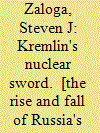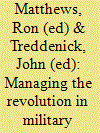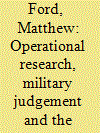| Srl | Item |
| 1 |
ID:
046178


|
|
|
|
|
| Publication |
Washington, Smithsonian Institution Press, 2002.
|
| Description |
viii, 296p.
|
| Standard Number |
1588340074
|
|
|
|
|
|
|
|
|
|
|
|
Copies: C:1/I:0,R:0,Q:0
Circulation
| Accession# | Call# | Current Location | Status | Policy | Location |
| 046047 | 355.02170947/ZAL 046047 | Main | On Shelf | General | |
|
|
|
|
| 2 |
ID:
046535


|
|
|
|
|
| Publication |
Hampsire, Palgrave, 2001.
|
| Description |
xxi, 273p.
|
| Standard Number |
0333781899
|
|
|
|
|
|
|
|
|
|
|
|
Copies: C:1/I:0,R:0,Q:0
Circulation
| Accession# | Call# | Current Location | Status | Policy | Location |
| 045145 | 355.02/MAT 045145 | Main | On Shelf | General | |
|
|
|
|
| 3 |
ID:
092952


|
|
|
|
|
| Publication |
2009.
|
| Summary/Abstract |
The central claim underpinning the Revolution in Military Affairs is that battlefield imperatives drive technical and more widely social change: that technology evolves according to a logic that starts with the relationship between the offence and defence in battle. Thus the ambition of the military organisation is to develop weaponry that can beat the adversary. A failure to grasp this essential truth leads to defeat in battle. This paper demonstrates how technology change happens in practice. By looking inside the 'black box' of the military organisation, what emerges is a more complicated picture that takes into account the way arguments for technical change are constructed and deployed within the bureaucracy based on a variety of battlefield interpretations. This shows that technology development is not necessarily driven by either frontline demands or scientific understanding but in reference to who has organisational power and how they use it.
|
|
|
|
|
|
|
|
|
|
|
|
|
|
|
|